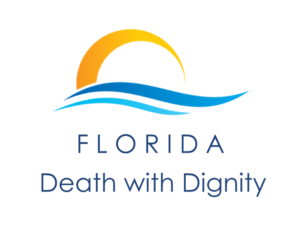Villager offers additional insight about medical aid in dying
February 10, 2023. Villages-News.com, Letter to the Editor. Author Kate Parker.
Editor’s Note: Villager Kate Parker, with a recent Letter to the Editor, set off quite a debate about end-of-life issues. In a followup Op-Ed, parker responds to a letter writer who raised questions about providing education about Medical Aid in Dying.
Janice Murrell was right when she wrote, “We live in a nation founded and preserved upon Thomas Jefferson’s Declaration of Independence which called out the idea that all men are created equal and endowed by their Creator with certain unalienable rights among these are Life, Liberty and the pursuit of Happiness.”
Liberty is a priceless characteristic of democracy. Citizens thrive when their governments allow them the freedom, the liberty, to make their own choices according to their own values and beliefs. The rights to self-determination, freedom of religion, and autonomy about our own bodies are sacred in American society. How many patriots want the government controlling whether we eat too much sodium, get enough exercise, or have another round of chemotherapy so we can make it to our son’s wedding?
The group at that table on Market Night were not promoting euthanasia or suicide. They were providing education about Medical Aid in Dying (MAiD), which allows qualified, terminally ill adults of sound mind and with six months or less to live, the legal right to request medication from their doctor to allow them to die peacefully if they get to the point that they can no longer tolerate the pain of their symptoms. People who support Medical Aid in Dying (MAiD) are patriots who believe that health care decisions should exist between a patient and their physician, without government interference. People who support MAiD respect the rights of those who would not choose to use the medication. They have the freedom, self-determination, and liberty to decide whether MAiD is right for themselves. Liberty means each of us has this right. Not everyone in the country has the same religious beliefs, political beliefs, or personal preferences. We are all responsible for ourselves and our choices as long as those choices do not impede the freedoms of other citizens.
MAiD laws have many safeguards to protect the vulnerable citizens in our society. To qualify for MAiD, a person must be an adult resident of the state, and two independent physicians must concur that the patient (a) has the mental capacity to make their own healthcare decisions, (b) is terminally ill, and (c) has 6 months or less to live. The patient must make two oral and one written request to obtain the medication (with waiting periods in between) and must self-administer the medication. Over 50 years of cumulative data in the eleven US jurisdictions where these laws exist show that the safeguards work – there have been zero cases of abuse or coercion. No physician, nurse or pharmacist can be forced to participate in MAiD, and patients can change their minds at any point in the process.
The Religious Alliance for Dignity in Dying, a group that exists to change the perception that religious people are universally against assisted dying, note that ‘a Populus survey commissioned in 2019 found that 80 percent of people with faith supported the legalization of assisted dying for terminally ill adults with mental capacity, whether they would want the choice for themselves or not.’ To those who would argue that MAiD is tantamount to suicide, please recognize that terminally ill patients don’t want to die…they want to live! If a patient wanted to end their life, they have the right to refuse medical treatment. Our laws support this freedom of self-determination even when medical treatments are available. Patients take the treatments because they want to live, but when the treatments stop working and death is imminent, shouldn’t that same autonomy allow them to self-administer medication to minimize their suffering if they decide it has become intolerable?
Unless you’ve worked in a hospice facility or experienced a loved one’s horrific death, you might not realize that in many cases the pain and suffering of the dying cannot be adequately controlled. There are many stories of terminally ill hospice patients suffering prolonged and painful deaths, coming in and out of consciousness, in severe distress and pain, gasping for breath, screaming, drowning in their own fluids, or vomiting their own feces. I believe that a loving God would have compassion for my choice to end my own suffering. My God and my country allow me to make my own moral decisions and be responsible for them. No one else can decide the value of my life for me, or the intensity of my pain. For any person or government to interfere is paternalistic and cruel — actions for which they will have to account or atone – just as Janice stated.
Kate Parker is a resident of the Village of Osceola Hills.

 Previous Post
Previous Post Next Post
Next Post